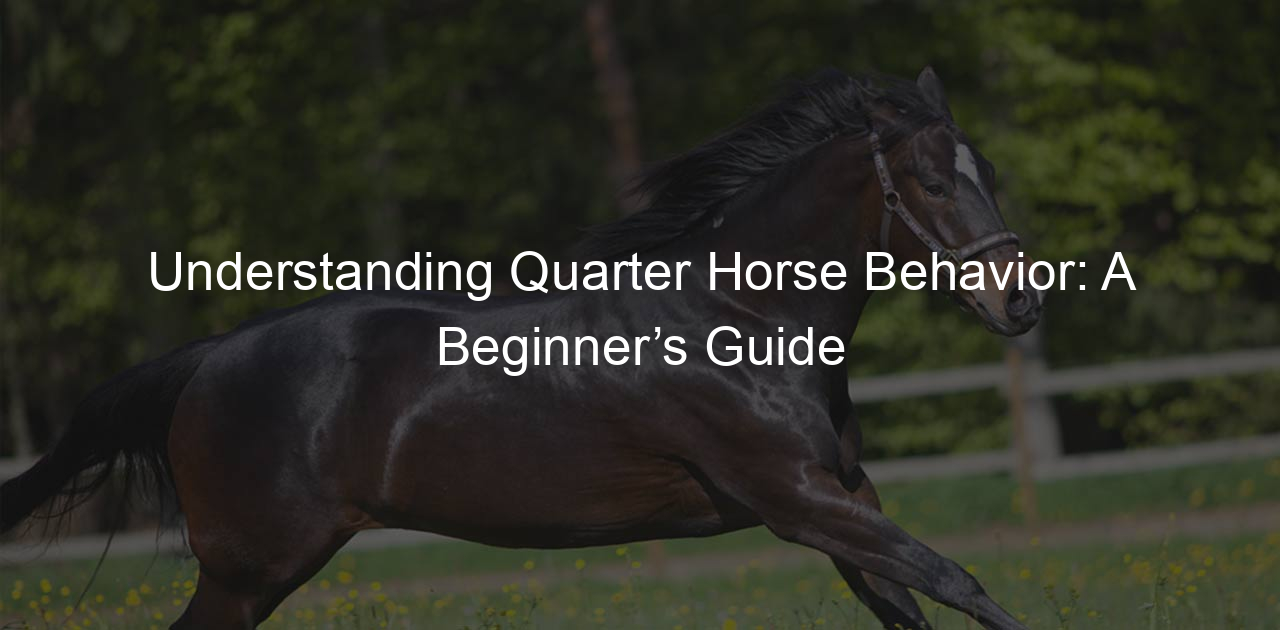
Introduction to Quarter Horse Winter Nutrition
- Importance of understanding Quarter Horse nutrition in winter:Winter can be a challenging time for Quarter Horses. Cold weather means they need more energy to stay warm. Proper nutrition is key to keeping them healthy and strong during these months. Understanding their nutritional needs helps prevent weight loss and health issues.
- Overview of the article:This article will guide you through the essentials of Quarter Horse winter nutrition. We will cover their nutritional needs in cold weather, feeding tips, necessary supplements, hay requirements, and how to maintain their weight. Additionally, we will discuss overall winter care to ensure your Quarter Horse stays in top condition.
Understanding the Nutritional Needs of Quarter Horses in Cold Weather
Energy Requirements
- Increased energy needs in winter: During the cold months, Quarter Horses need more energy to stay warm. Their bodies use extra calories to generate heat, which means they need more food to maintain their weight and health. According to experts, a horse’s energy needs can increase by up to 20% in winter.
- How to meet these needs: To ensure your Quarter Horse gets enough energy, you can provide more high-quality hay and grains. Hay is a great source of fiber, which helps in digestion and keeps the horse warm. You can also add grains like oats or corn to their diet for extra calories. Introduce any dietary changes gradually to avoid digestive issues.
Protein Requirements
- Importance of protein in a Quarter Horse’s dietIt helps build and repair muscles. Protein also supports the immune system. Without enough protein, horses can become weak and sick.
Young horses need more protein for growth. Pregnant mares also need extra protein. This helps their foals grow strong. Even older horses need protein to stay healthy.
According to experts, a horse’s diet should have about 10-12% protein. This ensures they get the right amount for their needs.
- Adjusting protein intake in winterWinter can be tough on horses. They need more energy to stay warm. This means their protein needs can change too.
In cold weather, horses may need more protein. This helps them keep their muscles strong. It also supports their immune system. A strong immune system helps them fight off winter illnesses.
Owners should check their horse’s diet in winter. Adding protein-rich feeds like alfalfa can help. It’s also good to talk to a vet. They can give advice on the right amount of protein for each horse.
| Horse Type | Protein Needs |
|---|---|
| Young Horses | Higher protein for growth |
| Pregnant Mares | Extra protein for foal development |
| Older Horses | Steady protein for health |
For more information on horse nutrition, you can visit Wikipedia.
Winter Feeding Tips for Quarter Horses
Feeding Frequency
- Recommended feeding frequency in winter: During the colder months, it is recommended to feed Quarter Horses at least three times a day. This helps maintain their energy levels and body temperature.
-
Benefits of frequent feeding:
- Improved digestion: Smaller, more frequent meals are easier for horses to digest.
- Stable energy levels: Regular feeding helps keep their energy levels steady throughout the day.
- Better weight management: Frequent feeding can prevent weight loss during winter.
Types of Feed
- Best types of feed for winterDuring winter, Quarter Horses need more energy to stay warm. The best types of feed for winter include:
- Hay: Good quality hay is essential. It provides fiber which helps keep horses warm.
- Grain: Grains like oats and barley can give extra energy.
- Beet Pulp: This is a great source of fiber and can be soaked to add moisture to the diet.
-
Pros and cons of different feed types
Feed Type Pros Cons Hay - High in fiber
- Helps keep horses warm
- Can be dusty
- Must be stored properly
Grain - High in energy
- Easy to digest
- Can cause colic if overfed
- Needs to be balanced with fiber
Beet Pulp - High in fiber
- Can be soaked for added moisture
- Needs soaking
- Can be messy
Winter Supplements for Quarter Horses
- Benefits of supplementsSupplements can help keep your Quarter Horse healthy during the cold months. They provide extra nutrients that might be missing from their winter diet. This helps in boosting their immune system and maintaining energy levels.
-
Recommended supplements for winter
- Vitamin E and Selenium: These help in muscle health and immune function.
- Omega-3 Fatty Acids: These are good for coat health and reducing inflammation.
- Probiotics: These support gut health and digestion.
- Electrolytes: These help in maintaining hydration, especially if your horse sweats a lot.
Winter Hay Requirements for Quarter Horses
Quality of Hay
- What to look for in quality hay:When choosing hay for your Quarter Horse in winter, look for hay that is green, leafy, and smells fresh. Avoid hay that is brown, dusty, or has mold. Good quality hay should have a high leaf-to-stem ratio and be free from weeds and foreign objects.
Timothy, alfalfa, and orchard grass are excellent choices. According to Wikipedia, these types of hay provide essential nutrients and are easily digestible.
- How to store hay in winter:Proper storage of hay is crucial to maintain its quality through the winter months. Store hay in a dry, well-ventilated area to prevent mold and spoilage. Keep hay off the ground using pallets or a similar method to avoid moisture absorption.
Cover the hay with a tarp or store it in a barn to protect it from snow and rain. Regularly check the hay for signs of moisture or mold, and remove any affected bales immediately.
| Type of Hay | Benefits |
|---|---|
| Timothy | High in fiber, good for digestion |
| Alfalfa | Rich in protein and calcium |
| Orchard Grass | Palatable and nutritious |
Quantity of Hay
-
How much hay to feed in winter
In winter, Quarter Horses need more hay to stay warm. A good rule is to feed about 2% of their body weight in hay each day. For example, a 1,000-pound horse should get around 20 pounds of hay daily.
Hay helps horses generate heat through digestion. This is important when temperatures drop. Always make sure your horse has enough hay to keep warm and healthy.
Horse Weight Daily Hay Amount 1,000 lbs 20 lbs 1,200 lbs 24 lbs 1,500 lbs 30 lbs -
Adjusting hay intake based on weather conditions
Weather can affect how much hay your horse needs. On very cold days, you may need to feed more hay. This helps your horse produce more body heat.
If it’s windy or wet, your horse might need extra hay too. These conditions can make it harder for horses to stay warm. Always check the weather and adjust the hay amount as needed.
For example, if the temperature drops below 32°F, consider adding an extra 2-3 pounds of hay per day. This small increase can make a big difference in keeping your horse comfortable.
Maintaining Quarter Horse Weight in Winter
Winter can be tough on Quarter Horses. Keeping their weight stable is important for their health. Here are some tips to help you manage their weight during the cold months.
- Monitoring weight changes: Regularly check your horse’s weight. You can do this by feeling their ribs and looking at their body condition. If you notice any changes, take action quickly.
- Adjusting diet to maintain healthy weight: In winter, horses need more calories to stay warm. Add extra hay or grain to their diet. Make sure they have access to fresh water, as it helps with digestion.
| Weight Monitoring Tips | Diet Adjustments |
|---|---|
| Feel ribs weekly | Increase hay intake |
| Check body condition score | Add grain if needed |
| Look for visible changes | Ensure fresh water |
By keeping an eye on your horse’s weight and adjusting their diet, you can help them stay healthy all winter long.
Winter Care for Quarter Horse Health
Exercise and Mental Stimulation
Keeping your Quarter Horse active during winter is crucial for their overall health. Let’s explore why regular exercise and mental stimulation are important during the colder months.
- Importance of regular exercise in winter:Even in winter, Quarter Horses need regular exercise to stay healthy. Exercise helps maintain muscle tone, supports joint health, and prevents weight gain. It also boosts their immune system, helping them fight off winter illnesses.
- Ways to provide mental stimulation:Horses can get bored during winter if they are stuck in the stable for long periods. Mental stimulation is just as important as physical exercise. Here are some ways to keep your horse’s mind active:
- Interactive toys: Toys like treat balls can keep your horse entertained.
- Training sessions: Short, regular training sessions can teach new skills and keep their mind sharp.
- Social interaction: Allowing your horse to interact with other horses can provide mental stimulation.
| Activity | Benefits |
|---|---|
| Regular Exercise | Maintains muscle tone, supports joint health, prevents weight gain, boosts immune system |
| Interactive Toys | Prevents boredom, provides mental stimulation |
| Training Sessions | Keeps mind sharp, teaches new skills |
| Social Interaction | Provides mental stimulation, prevents loneliness |
Regular Health Checks
- What to check forRegular health checks are important to keep your Quarter Horse healthy during winter. Here are some key things to look for:
- Body Condition: Make sure your horse is not losing weight. You should be able to feel their ribs but not see them.
- Coat Condition: A healthy horse will have a shiny coat. If the coat looks dull, it might be a sign of poor health.
- Hoof Health: Check for cracks or signs of infection. Winter can be hard on hooves due to wet and cold conditions.
- Appetite: Your horse should have a good appetite. A sudden loss of interest in food can be a warning sign.
- Behavior: Look for any changes in behavior. If your horse seems lethargic or unusually aggressive, it might be time for a check-up.
-
When to call a vet
Knowing when to call a vet can save your horse’s life. Here are some situations when you should seek professional help:
- Severe Weight Loss: If your horse is losing weight rapidly, call a vet immediately.
- Persistent Cough: A cough that doesn’t go away could be a sign of respiratory issues.
- Swelling or Lameness: Any swelling or signs of lameness should be checked by a vet.
- Changes in Eating or Drinking: If your horse stops eating or drinking, it’s a serious concern.
- Unusual Behavior: Sudden changes in behavior, such as aggression or depression, can indicate health problems.
Conclusion: Quarter Horse Winter Feeding Guidelines
-
Recap of best practices for Quarter Horse nutrition in winter:
- Ensure your horse has access to plenty of high-quality hay. This helps them stay warm and meet their energy needs.
- Provide a balanced diet with the right mix of protein, fats, and carbohydrates.
- Offer fresh water that is not frozen. Horses need to stay hydrated even in cold weather.
- Consider adding winter supplements like Vitamin E and Selenium to support their immune system.
- Monitor your horse’s weight regularly to adjust their diet as needed.
-
Final tips and advice:
- Always consult with a veterinarian or equine nutritionist before making significant changes to your horse’s diet.
- Keep an eye on your horse’s behavior and health. Changes can indicate nutritional needs or health issues.
- What works for one might not work for another.
- Maintain a regular feeding schedule to keep your horse’s digestive system healthy.
- Ensure your horse has shelter from harsh weather conditions.
By following these guidelines, you can help ensure your Quarter Horse stays healthy and happy throughout the winter months.









